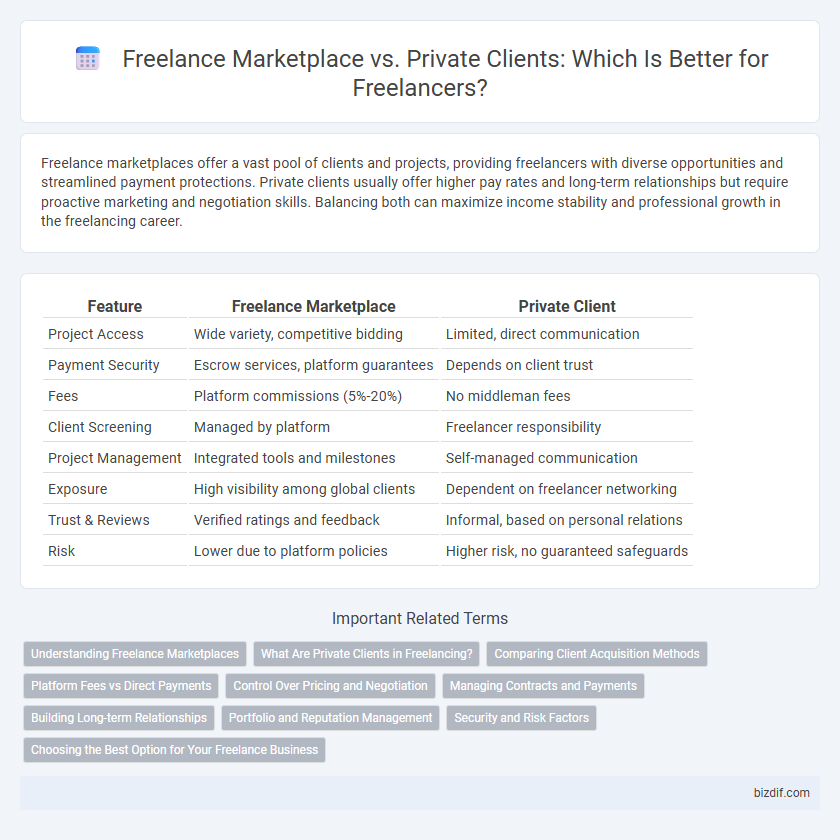Freelance marketplaces offer a vast pool of clients and projects, providing freelancers with diverse opportunities and streamlined payment protections. Private clients usually offer higher pay rates and long-term relationships but require proactive marketing and negotiation skills. Balancing both can maximize income stability and professional growth in the freelancing career.
Table of Comparison
| Feature | Freelance Marketplace | Private Client |
|---|---|---|
| Project Access | Wide variety, competitive bidding | Limited, direct communication |
| Payment Security | Escrow services, platform guarantees | Depends on client trust |
| Fees | Platform commissions (5%-20%) | No middleman fees |
| Client Screening | Managed by platform | Freelancer responsibility |
| Project Management | Integrated tools and milestones | Self-managed communication |
| Exposure | High visibility among global clients | Dependent on freelancer networking |
| Trust & Reviews | Verified ratings and feedback | Informal, based on personal relations |
| Risk | Lower due to platform policies | Higher risk, no guaranteed safeguards |
Understanding Freelance Marketplaces
Freelance marketplaces provide a structured platform connecting clients and freelancers with streamlined payment systems, dispute resolution, and a wide range of project categories, making them ideal for gaining exposure and quick job acquisition. Private clients, on the other hand, often offer personalized engagements with potentially higher rates but require more effort in client acquisition and contract management. Understanding the benefits and challenges of freelance marketplaces helps freelancers strategically choose between broad market access and tailored client relationships for sustainable income growth.
What Are Private Clients in Freelancing?
Private clients in freelancing are individuals or businesses that hire freelancers directly without intermediaries or platforms, often establishing personalized agreements and ongoing relationships. These clients provide greater flexibility in project scope and pricing while fostering trust and clear communication, which can enhance work quality and client satisfaction. Managing private clients effectively requires strong negotiation skills, professional reliability, and tailored marketing strategies to build a sustainable freelance career.
Comparing Client Acquisition Methods
Freelance marketplaces provide access to a broad pool of clients through structured platforms, enabling quicker project bids and transparent feedback systems. Private client acquisition relies heavily on personal networking, referrals, and direct outreach, often leading to higher-value projects but requiring more time and effort to establish trust. Each method impacts freelance income stability differently, with marketplaces offering consistent opportunities and private clients potentially delivering long-term partnerships.
Platform Fees vs Direct Payments
Freelance marketplaces typically charge platform fees ranging from 5% to 20%, which can significantly impact overall earnings. Direct payments from private clients eliminate these fees, allowing freelancers to retain 100% of their income. However, private client work often requires more effort in client acquisition and contract handling.
Control Over Pricing and Negotiation
Freelancers working through freelance marketplaces often face fixed pricing structures and platform fees that limit their control over negotiation and final project costs. Engaging directly with private clients allows freelancers greater autonomy to set custom rates, negotiate terms, and tailor pricing based on project scope and client budget. This direct interaction enhances profitability and flexibility, bypassing intermediary restrictions common in marketplace environments.
Managing Contracts and Payments
Freelancers managing contracts and payments through freelance marketplaces benefit from built-in escrow services, standardized agreements, and dispute resolution systems ensuring secure transactions and clear expectations. Private clients often require freelancers to draft bespoke contracts and personally track payments, increasing administrative responsibility but allowing for tailored terms and potentially higher earnings. Effective management of contracts and payments directly impacts cash flow stability and client relationship trust in both freelance marketplaces and private engagements.
Building Long-term Relationships
Building long-term relationships in freelancing is more effective with private clients due to direct communication and personalized project expectations. Freelance marketplaces often prioritize short-term gigs, limiting opportunities for trust and rapport development crucial to repeat work and referrals. Establishing a consistent client base through private contracts enhances stability and growth in a freelancer's career.
Portfolio and Reputation Management
Freelancers leveraging a freelance marketplace benefit from built-in portfolio showcases and client reviews that enhance visibility and credibility, speeding up reputation building. In contrast, private clients require freelancers to proactively manage and present personalized portfolios and secure testimonials to establish trust and attract consistent work. Effective reputation management in both scenarios is crucial for maintaining long-term freelance success and increasing project opportunities.
Security and Risk Factors
Freelance marketplaces offer built-in security features such as escrow payment systems and dispute resolution services, reducing financial risks for both freelancers and clients. Private client engagements often lack these protections, increasing vulnerability to payment delays, fraud, and contract breaches. Choosing the right platform or client type involves balancing control and personalized agreements against the level of security and risk mitigation provided.
Choosing the Best Option for Your Freelance Business
Freelance marketplaces offer access to a vast pool of clients, streamlined payment systems, and project management tools, making them ideal for beginners seeking steady work and exposure. Private clients often provide higher rates, long-term relationships, and greater creative control, benefiting experienced freelancers who value direct communication and customized project scopes. Assessing your business goals, skill level, and preferred workload flexibility will help determine the best option for sustainable growth and income stability in your freelance career.
Freelance Marketplace vs Private Client Infographic

 bizdif.com
bizdif.com